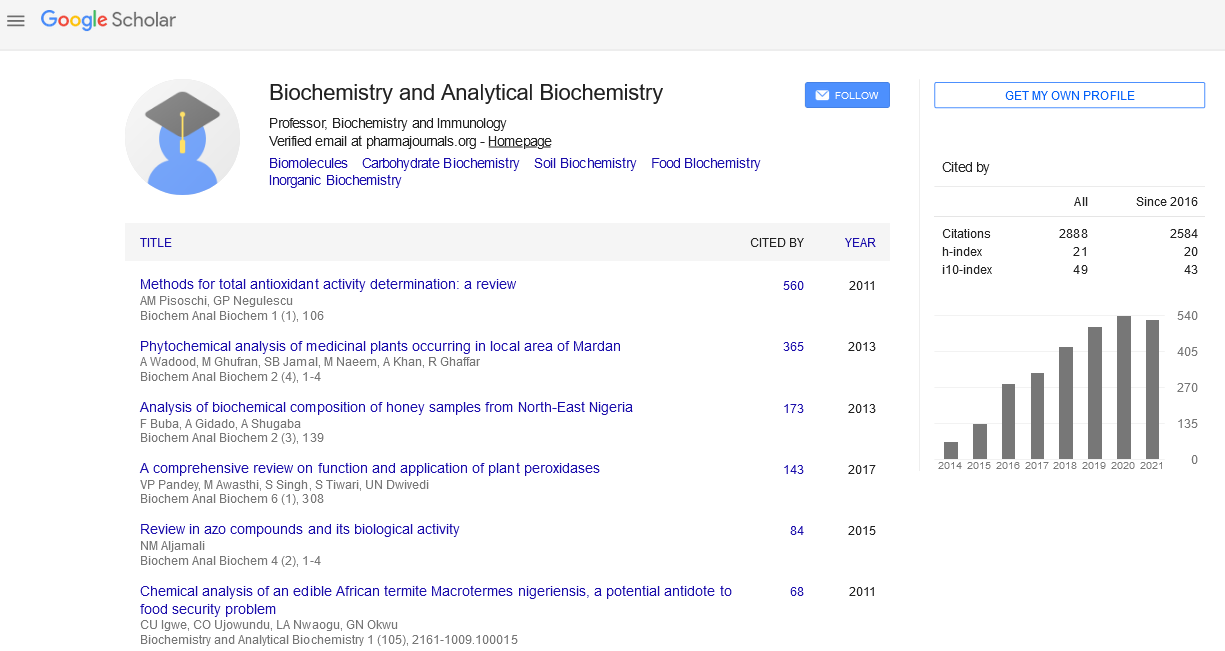Indexed In
- Open J Gate
- Genamics JournalSeek
- ResearchBible
- RefSeek
- Directory of Research Journal Indexing (DRJI)
- Hamdard University
- EBSCO A-Z
- OCLC- WorldCat
- Scholarsteer
- Publons
- MIAR
- Euro Pub
- Google Scholar
Useful Links
Share This Page
Journal Flyer

Open Access Journals
- Agri and Aquaculture
- Biochemistry
- Bioinformatics & Systems Biology
- Business & Management
- Chemistry
- Clinical Sciences
- Engineering
- Food & Nutrition
- General Science
- Genetics & Molecular Biology
- Immunology & Microbiology
- Medical Sciences
- Neuroscience & Psychology
- Nursing & Health Care
- Pharmaceutical Sciences
Hereditary spastic paraplegias: Identification of a novel SPG57 variant affecting TFG oligomerization and description of HSP subtypes in Sudan
International Conference on Biochemistry
October 10-12, 2016 Kuala Lumpur, Malaysia
Ashraf Yahia Osman Mohamed
National University-Sudan, Sudan
Posters & Accepted Abstracts: Biochem Anal Biochem
Abstract:
Hereditary spastic paraplegias (HSP) are the second most common type of motor neuron disease recognized worldwide. HSP can be pure or complex according to the absence or presence of additional neurological and non-neurological manifestations. There are more than 67 known HSP genes with different patterns of inheritance. Autosomal dominant HSP forms are the most frequent in western populations while recessive HSP predominates in highly consanguineous communities. Our goals were to estimate the relative frequencies of known HSP genes in Sudanese families with the disease and perform genotype-phenotype correlation to extend the clinical spectrum associated with HSP genes. We have used next generation sequencing to screen 74 HSP-related genes in 23 consanguineous families from Sudan and candidate gene sequencing in two other families (total of 25 families). We established a genetic diagnosis in six families with autosomal recessive HSP (SPG11 in three families and TFG/SPG57, SACS, and ALS2 in one family each). An autosomal dominant HSP (ATL1/SPG3A) was also identified in one additional family. Six out of seven identified variants were novel. The TFG/SPG57 variant (p.(Arg22Trp) in the PB1 domain) is the second SPG57 HSP variant to be identified worldwide, and we demonstrated its impact on TFG oligomerization in vitro. There were no patients with visual impairment as observed in a previously reported SPG57 family (p. (Arg106Cys) in coiled coil domain), suggesting unique contributions of the PB1 and coiled coil domains in TFG complex formation/function and a possible phenotype correlation to variant location. Some families manifested marked phenotypic variations implying the possibility of modifier factors complicated by high inbreeding. In conclusion, we identified the first Sudanese families carrying novel variants in 6 HSP genes. The difficulty to reach a genetic diagnosis in the majority of studied families suggests the possibility of new genes, unusual models of inheritance or noncoding variations underlying spinocerebellar degeneration.
Biography :
Email: kambalawy@hotmail.com


